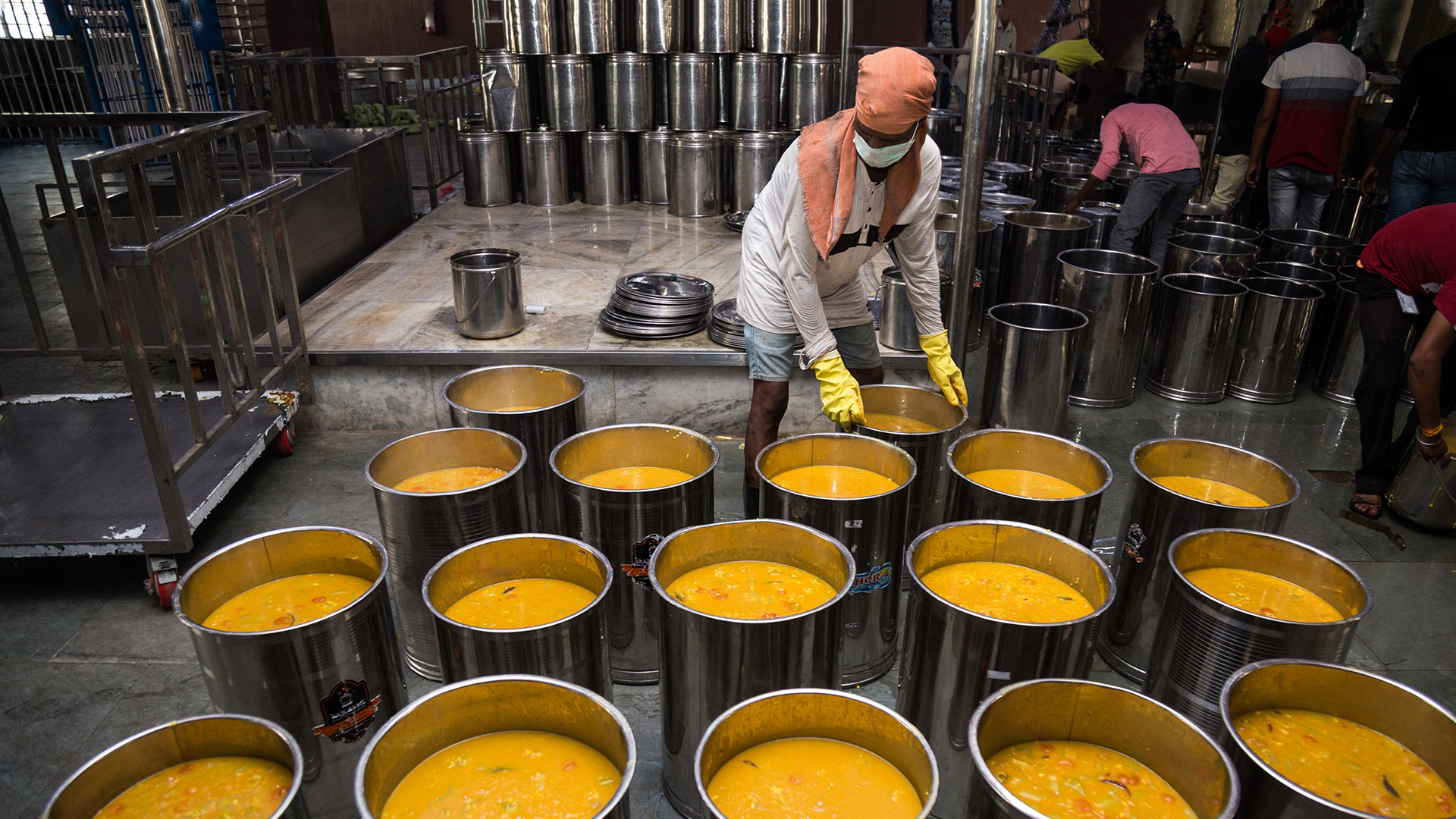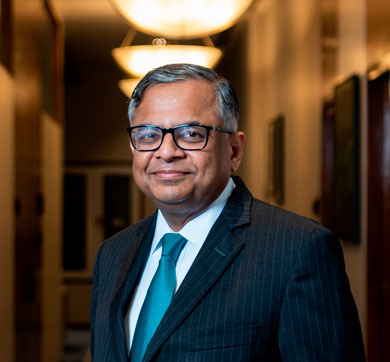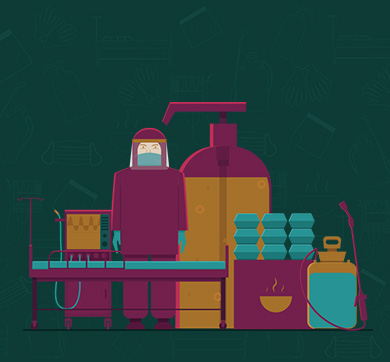July 2020 | 3030 words | 11-minute read
It was only March 5, 2020 — a time when WHO was yet to classify Covid-19 as a pandemic, and no one had imagined that India would go into a national lockdown within 20 days and remain under it for months after. But in an office in Jamshedpur several Tata Steel leaders were gathered to chart out a course of action for what they saw coming.
Chanakya Chaudhary, vice president, Corporate Services, Tata Steel, who was in the room that day, says, “The fact that we started a little early in this journey helped. After that March 5 meeting, we immediately met with Mr TV Narendran, CEO & MD, Tata Steel, and he gave us the go ahead to get together and start working on the points we had come up with.
“It also helped that we had colleagues in Singapore and Europe who had begun facing the crisis before us and were able to give us inputs on what was happening and what to expect. All of this gave us time to plan a strategy.”
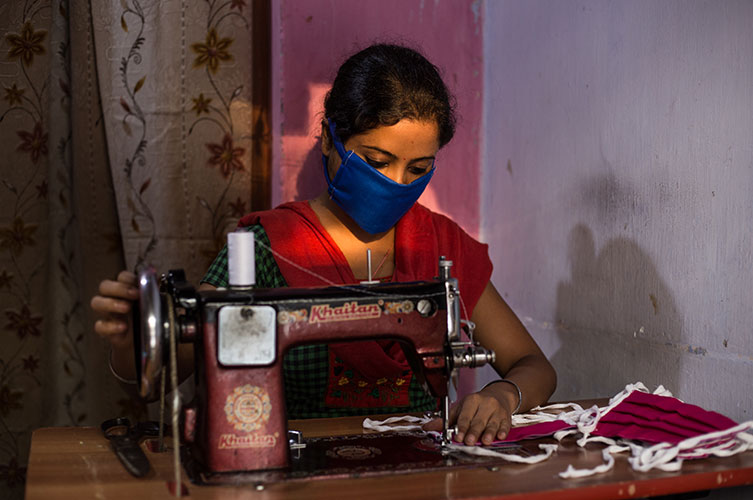
At the heart of this strategy was #CombatCovid-19 — the Tata Steel Foundation’s (TSF) 10-point agenda to support the community.
“Since TSF always has an ear to the ground, we started sensing some things upfront on what the communities we serve may go through once the pandemic arrives. One was a lot of information gap leading to uncertainty and angst among communities. That was our starting point — to start disseminating information,” says Sourav Roy, chief, CSR, Tata Steel. “We immediately recorded messages in three or four locally spoken dialects and worked with local and district administrations to send out vehicles to play those messages. We also decided that we would leave some public messaging — like banners with easy-to-understand graphics — wherever we went.”
Then came the lockdown
While some were expecting it by then, the reality of the lockdown still hit hard. It was even more magnified for those who did not have enough information. TSF responded with a telephonic or video-based outreach to the sarpanch (head of the village local self-government in India) and around 10 other people with influence like teachers, school principals and village elders in more than 300 gram panchayats. They also leveraged their existing network of public health workers like sahiyyas and Anganwadi workers. This morphed into #DigitalBridges — the first of the 10 initiatives.
TSF deployed #DigitalBridges and its own vast employee and informal networks in the meanwhile to understand the evolving needs of the crisis. Their in-house mapping revealed the extent of the worst-hit settlements and ignored communities like transgenders, street children, leper colonies, sex workers and daily wage earners. It was less than a week into the lockdown, and loss of income and lack of food were already a reality for many. The #ThoughtforFood initiative was immediately put into place to reach at least one warm wholesome meal a day to 50,000 families in and around Jamshedpur while the lockdown prevails. In the far-flung areas, where cooked meals couldn’t be sent, TSF supplied dry ration packets — each with enough food to last a family of five for 15 days. By June 25, they had served 27.4 lakh+ cooked meals across 184 settlements in Jamshedpur and 48,000+ ration packets elsewhere.
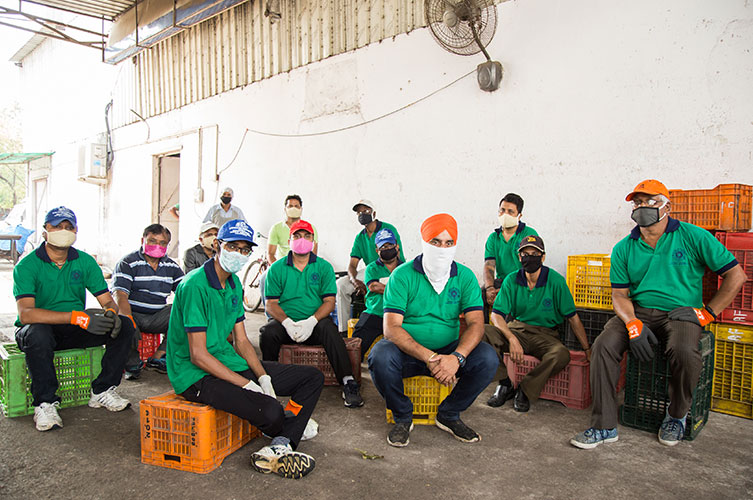
“It is important to remember that we were doing this at a time when the neighbouring wards were treating Covid-19 patients. Everybody going there to work, our employees as well as our contractors, risked their lives to set up this facility.”
Similar work was undertaken at four more hospitals in Mumbai — an 80-bed isolation facility at St George Hospital, a 72-bed isolation facility at HBT Trauma Care Centre, a 255-bed facility at Seven Hills Hospital and a 60-bed isolation facility at the Tata Memorial Advanced Centre for Treatment, Research and Education in Cancer, Kharghar. Work has also been initiated for the conversion of another KEM ward into a 50-bed ICU.
The company’s other projects across the country include a 20-bed ICU and medical gas line for 200 beds at the Sir CV Raman General Hospital in Bengaluru, Karnataka; facilities for 288 general ward beds, 36 ICU beds and 36 private ward beds in Rudrapur, Uttarakhand; and quarantine and isolation wards, with 125-beds, medical equipment and medical furniture, at the TCS premises in Noida, Uttar Pradesh (UP).
“The other thing we realised,” says Mr Roy, “is that it is impossible to address an emergency of this scale unless you work with public systems and with access to public finance. That’s where our #StrongerTogether programme came in. We set up possibly Jharkhand’s first District Response Coordination Group in East Singhbhum. The district administration and TSF are jointly leading a civil society coordination group for the district to ensure more overlap between public systems and civic society.
“This has also been our approach across Odisha and Jharkhand where our response has always prioritised our communities but worked through public systems from the grassroots to the state. We have also been particularly conscious of working with the traditional adivasi leadership structures and been humbled at the meaningful reach that this approach has afforded us.”
Mr Chaudhary adds, “It’s not just the district administrations of East Singhbhum (Jharkhand) or Jajpur or Ganjam (Odisha) but also their state governments and the union government that worked with us to assess needs and reach aid. There is a recognition of Tata Steel’s legacy and confidence in our experience.”
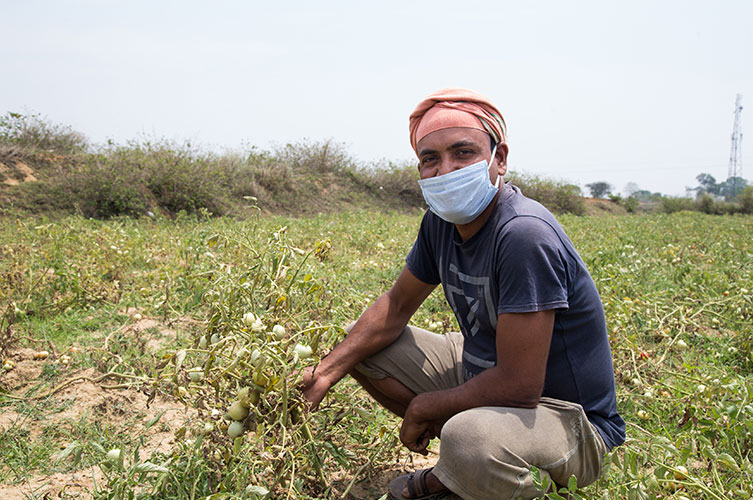
Not without dignity
It is this experience that made TSF very conscious of not creating dependencies. “You can reach food, but at the end of the day, dignity lies in creating incomes, and thereby choice, in the hands of the people,” Mr Roy notes. “#DigitalBridges served as a terrific needs assessment tool for us.”
It led to the concept of #FromtheFarm, connecting farmers whose produce was not being sold due to the lockdown with Zomato and Swiggy. It created a direct supply chain that allowed them to not only sell their produce but do so at the right prices. As on June 25, 2020, the initiative had led to the sale of more than 14,330kg of fresh vegetables, supporting 200+ farmers with cumulative income of Rs. 7.32 lakh.
TSF also started a #CashforWork initiative instead of direct cash transfers. They created income through a combination of modular kitchen gardens, making bags from newspapers and tie-ups with artisans. As on June 25, the initiative had reached 2,800+ households with a cumulative income of Rs. 21.15 lakh.
“The other piece that we started reasonably early is the #StitchinTime masks programme,” says Mr Roy. “We created 1.01 lakh masks and distributed them among the vulnerable communities. In the districts that we operate, every single frontline health worker has received a mask from the TSF. There are 190+ families that are now making masks for us, giving them an income.”
He adds, “16,000+ people have benefitted from the income generated from all these initiatives put together.”
Social from a distance
As the work with communities grew, it brought to light the under-reported mental health issues due to the crisis. TSF responded with #FriendinNeed and #HopeSprings. While the former boosted the capacity of an existing suicide and depression helpline in Jamshedpur to accept more calls, the latter worked with psychiatrists and happiness practitioners to create stress management and counselling modules for frontline workers and migrants.
It also shone a light on society’s forgotten people. “There were large pockets of people who were being stranded all over — old-age homes, children’s homes, sex workers and their children, institutions for those with intellectual disabilities, etc,” says Mr Roy. “Meanwhile, we had many employees who were at home due to the lockdown. So, we started the #FarRishta initiative with the tagline ‘it is possible to be social from a distance’. The idea was to create nationwide social capital and reach out to anyone and everyone who is stranded somewhere.”
So far, almost 1,800+ volunteers have given their time and reached 22,900+ people across 19 states and union territories of the country.
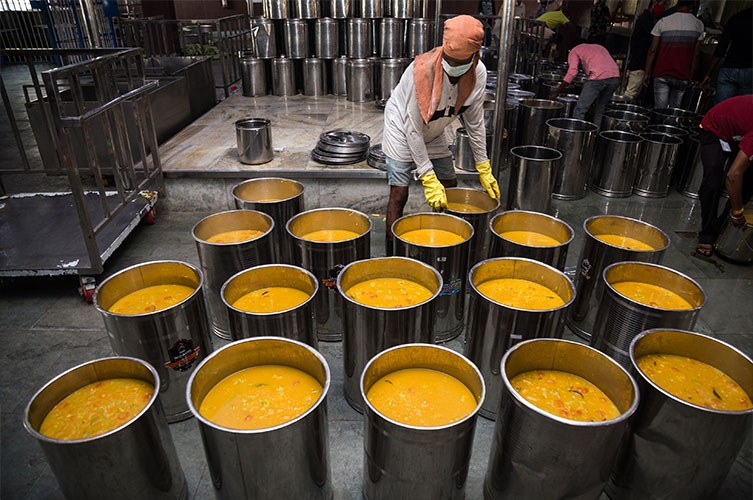
No one takes a back seat
#FarRishta has since been recognised by two state governments and extended to many other cohorts, including sex workers and acid attack victims. It has also helped TSF continue its work with children from its residential bridge schools and other scholars supported by Tata Steel.
Mr Roy explains, “The question was are they safer in school or back home. We had to decide which children had to stay, who could go back home, how to send them back and continue to be responsible for their learning progress and wellbeing while they are in their homes.
“It’s not just them. We have our skill development institutes, the tribal leaders’ network, etc, which are all permanent relationships. With the size of our work, we are very conscious of the fact that there are some promises that are year-on-year promises. We can’t suddenly run away from them. There is a huge amount of work that is going on away from any spotlight.”
TSF brings the same commitment to the #CombatCovid-19 programme, which had reached 7.61 lakh+ people across 25 states by June 25. Barring those that involve distribution of goods, all the initiatives have a long-term vision.
Digital Bridges 2.0
The 10th and latest initiative of TSF’s #CombatCovid-19 programmes is Digital Bridges 2.0, to reach relief and rations to migrant workers across the country.
“When we started interacting with migrant workers, we realised we don’t have the luxury of time,” says Sourav Roy, chief, CSR, Tata Steel. “There was a pregnant woman who was about to deliver with nowhere to go. We had someone who needed dialysis but had no money. Women who were on the verge of being trafficked and needed protection. We didn’t have the luxury of putting in systems and processes. We just needed to do something. Right now. So, we tried to do this in a slightly different way by relying on our networks of Tribal Leadership Programme, friends and family to raise money.”
He adds, “We have to also remember that a migrant worker has migrated because she or he wanted a life of dignity and not one of dependence back home. They don’t like living off charity. We have identified the top concerns of the migrants who are returning to the district and are collaborating with the district administration to set up a District Migration Resource Centre.”
It has a control room with manned telephone lines for returning migrants, starting from the quarantine period, whether institutional or at home.
“One of the key things we are doing as part of the Digital Bridges 2.0 programme and the migrant resource centre is helping migrants register on a state-run app meant for them,” Mr Roy says. “Less than 25 percent of migrant workers have access to a smartphone, and only 70 percent of that number have a data pack. By now, only half of that 70 percent will have any money left for an active data plan. And if they don’t register, they don’t get information about the buses and the trains being run.”
The resource centre is also looking at how the institutional quarantine experience can be made engaging and constructive by creating economic incentives or income or skills building programmes.
“We can reasonably assume that 50 to 60 percent of the returning migrant workers may not want to go back, at least not immediately,” says Mr Roy. “We are mapping their skills and what sort of work they want to do. Often there is a dissonance between the skills that are coming back and the skills that can be deployed. What kind of economic incentives do we create for them? The primary purpose of the District Migration Resource Centre is to look at reverse migration as a social issue in addition to it being a logistical and medical problem.”
By June 25, Digital Bridges 2.0 had reached 94,000+ returning workers across 24 states and union territories.
The invisible force
“This is unlike most other calamities or emergencies,” says Mr Roy. “It has affected everyone, and as we went from lockdown to lockdown, more people became vulnerable. The biggest challenge has been that the definition of vulnerable has been shifting almost on a daily basis.”
Another challenge was to conceptualise and execute ideas in record time like moving from a couple of hundred meals a day to 50,000 meals a day in seven days or setting up a supply chain for farmers in just four days.
The momentum was fuelled by Tata Steel’s 596-strong CSR team. “It is important to remember that we are an implementing CSR organisation. In the past, a lot of the team have also volunteered for the group’s disaster response work, which is coming in very handy right now,” he says.
He adds, “But what is even more useful is the TSF team’s experience of working with the communities. They understand the communities as human beings. Looking at data and numbers gives you a definition of the problem, but the solution can only come once you look at human beings, family structures, stories and what constitutes identity. The intangible work that we do is coming in really useful right now.”
The other powerful intangible at play, according to him, has been the latent goodness in people. “The whole point of our programmes like #FarRishta and #DigitalBridges2.0 is to tap into the fundamental goodness among people, which we believe exists,” he explains. “We do a lot of our work with that fundamental belief, and no virus is taking that away. There are people who are raising their hands and doing brilliant stuff. That gives us a lot of hope.”
He adds, “What’s also been terrific is the way the Tata group has been able to launch a multi-faceted response whether it is spurring on scientific research, procuring equipment, enhancing or setting up medical infrastructure or reaching out to people in strife. It makes one feel very proud to be a part of a group like this, which doesn’t stop at financial allocations but leverages everything that it has at its disposal.”
Helping hands
Tata Motors*
- Served 3.36 lakh+ cooked meals and distributed 20,500+ grocery kits
- Established helpline numbers for foodrelated requests from temporary and contractual workers
- Served 5,850+ stranded truck drivers and co-drivers
- Disinfected 97,000 vehicles — buses, rickshaws and private vehicles — as part of a partnership with the Delhi Transport Corporation
- Conducted awareness campaigns through social media, banners, posters and other sensitisation tools
- The International business of Tata Motors extended support in the form of funds, meals, medical supplies in Sri Lanka, Bangladesh, Malaysia, the Philippines, Thailand, Nepal, Vietnam and Uganda
TCS**
- Created advisories, audio messages and posters in 10 Indian languages focusing on physical and emotional well-being guides, which have been virtually delivered to 4.5 lakh+ people in rural areas
- With 22 million+ Americans filing for unemployment benefits, the company offered pro bono services to improve the performance and capacity of the benefits systems in 18 states across the United States
- Reached 18,000 students in underdeveloped areas of South Africa through a digital awareness campaign
- As an aggregator of more than 200 food banks, helped Feeding America build a system for allocation of food, services and donations
Tata Chemicals*
- 2 lakh masks being created by Okhai and self-help groups
- Supported 325+ farmers by connecting them to households in Mithapur and Dwarka, selling 47,000+kg of vegetables and distributed 10,000 seed kits across 42 villages of Gujarat for kitchen gardening
- Provided dry ration kits to 9,500+ families in Gujarat, Tamil Nadu, Andhra Pradesh, Madhya Pradesh, Telangana, West Bengal and hygiene kits to 10,000 families in Mithapur
- Held awareness drives in 43 villages across Gujarat and Andhra Pradesh
Tata Power*
- 6.84 lakh+ face masks being stitched through Dhaaga, a women empowerment initiative
- Supported 5 lakh+ people with food grains
- Reached 4.6 lakh+ people through awareness campaigns, sanitisation, mobile medical services, etc
- Supported farmers in marketing 68,000kg+ of vegetables
- Facilitated supply of green fodder for 3,600 cattle daily amounting to 43MT
- Linked 4 lakh+ people with public distribution systems to get dry ration and food packets
Tata Consumer Products Limited**
- Organised awareness drives for communities in and around plantations and estates and distributed 1.65 lakh masks
- Donated close to 4 tonnes of food grains, tea and coffee, disinfectants through Tata Coffee
- Ensured 4,000+ migrant workers safe travels back to their home district/state through Tata Coffee
- Provided food kits to the elderly through Tata Cha and a tie-up with Helpage India
- Partnered with the Khichdi Project to provide ingredients like salt and pulses for meals for migrant workers and families in Mumbai, helping them provide 30,000 meals a day for 10 days
- Contributed an amount equal to 2 lakh cups of tea to ease the situation for tea shop owners in Tamil Nadu
- Supported hospitals and emergency services across the United Kingdom, the United States, Poland, Australia and Canada with donations and care packages
Tata Communications**
- Provided meals and ration to 58,000 people in Delhi, Maharashtra (Mumbai, Pune and Nandurbar) and Karnataka (Bengaluru)
- Conducted sensitisation sessions on Covid-19 safety measures in Odisha and Jharkhand
- Collaborated with Tata Power Delhi Distribution Ltd in Delhi to support 1,000 migrants
Tata Realty and Infrastructure**
- Distributed food and hygiene kits to 9,400 migrant workers for three weeks
Titan Company**
- Provided food and water to 12,200 migrants in Hosur and Bengaluru
Tata Projects**
- Provided food supplies to ~4,000 migrant families in Bihar, Odisha, Telangana and Arunachal Pradesh
Tata Advanced Systems Ltd**
- Provided 1,500 food packets daily to migrant and daily wages workers near Tata Advanced System Ltd’s factories in Bengaluru for 30 days
Jaguar and Land Rover*
- Deployed 370+ vehicles globally to support Red Cross and other emergency response organisations during the pandemic
*Data as on June 15, 2020
**Data as on May 31, 2020
—Monali Sarkar

